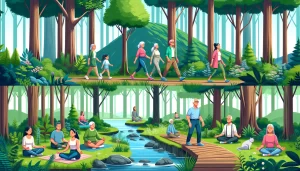
Leisure Activities, Resilience, and Happiness: A Positive Chain Reaction
Imagine taking a break from your busy day to stroll through the park, play a pickup game of soccer, or even enjoy a quiet moment with a good book. While these moments may seem simple, new research shows that they could have a profound impact on your well-being. In a study conducted in Turkey, researchers explored the relationship between leisure activities, perceived health, resilience, and happiness. The results? Engaging in recreational activities not only boosts happiness but also strengthens resilience, which acts as a buffer against life’s challenges. Let’s dive into this research and discover how leisure time can build a happier, more resilient you.
How Leisure Time Impacts Health and Happiness
It’s no secret that physical activity is good for your body, but did you know it’s just as beneficial for your mind? Previous studies have shown that recreational activities—whether walking, jogging, or playing a team sport—can enhance our perceived health and happiness. However, this study takes it a step further by examining why this happens. The researchers surveyed 451 adults across different regions in Turkey to better understand the connection between leisure activities, health perception, and happiness.
They found that people who regularly participate in recreational activities experience greater perceived health benefits, such as feeling more energetic, less stressed, and better able to manage their emotions. This sense of well-being contributes directly to happiness, making it easier to enjoy life and maintain a positive outlook.
The Role of Resilience in the Happiness Equation
One of the most exciting discoveries in this study is the role that resilience plays in linking recreation and happiness. Resilience is our ability to bounce back from adversity—to weather life’s storms with strength and flexibility. The research revealed that resilience acts as a bridge between the health benefits of leisure activities and happiness. In other words, when we feel healthier due to recreational activities, we also become more resilient, which in turn makes us happier.
Engaging in regular physical activity is like building up a “happiness shield.” The healthier and more resilient you feel, the better equipped you are to handle stress, disappointments, or challenges that come your way. This emotional strength fosters a greater sense of happiness and well-being.
Why This Matters in a Post-Pandemic World
The importance of recreation has become more evident in recent years, especially in light of the COVID-19 pandemic. Lockdowns and social distancing measures significantly impacted people’s physical and mental health, with increased levels of sedentary behavior leading to higher rates of anxiety and depression. However, the research suggests that even low-intensity activities, such as walking or participating in online fitness classes, can alleviate these symptoms.
As we continue to adjust to post-pandemic life, prioritizing recreational activities may offer an effective way to improve public health. Whether through community sports programs, accessible parks, or workplace wellness initiatives, the findings support the idea that promoting physical activity can lead to a healthier, happier, and more resilient society.
Practical Takeaways for Public Health Practitioners
The findings of this study have significant implications for public health practitioners, policymakers, and anyone involved in promoting wellness. Here are a few practical takeaways to consider:
- Encourage Regular Participation in Recreational Activities: Recreation’s positive effects on happiness and resilience highlight the need for programs that promote consistent physical activity. Whether through structured sports leagues, fitness classes, or simply encouraging more outdoor time, public health campaigns should emphasize the value of leisure time.
- Invest in Recreation Infrastructure: It is critical to create safe and accessible spaces for recreational activities. Parks, community centers, and walking trails should be seen as essential infrastructure that contributes to physical and mental well-being.
- Develop Resilience-Building Programs: Since resilience mediates the relationship between health and happiness, public health initiatives that focus on building psychological resilience could have far-reaching effects. Incorporating mindfulness, stress management, and social support into recreational programs may further enhance these benefits.
- Leverage Policy to Support Work-Life Balance: Policymakers can ensure that individuals have the time and resources to engage in recreational activities. By promoting work-life balance, they can help reduce stress and increase opportunities for leisure, ultimately leading to a healthier and happier population.
The Science of Resilience and Happiness
So, how does resilience work its magic? The study’s authors draw on Fredrickson’s broaden-and-build theory to explain the connection. This theory suggests that positive emotions—like those experienced during enjoyable recreational activities—help expand our thinking and increase our resources, such as resilience. When we feel good, we’re more likely to see challenges as opportunities rather than obstacles. Over time, this builds up our ability to handle stress, leading to greater happiness and life satisfaction.
Interestingly, the researchers also found that resilience doesn’t just make us happier—it changes how we perceive the health benefits of our activities. More resilient people tend to feel even greater health improvements from their leisure activities, creating a reinforcing cycle of health, resilience, and happiness.
Join the Conversation
Now, it’s your turn! How do you incorporate leisure activities into your life, and what benefits have you noticed? Do you think resilience plays a role in your happiness? Join the conversation by sharing your thoughts in the comments or on social media.
Be Part of the Change – Get Weekly Updates!
Stay informed and connected. Subscribe for free and share this blog to make a difference in public health with others. If you liked this blog, please share it! Your referrals help This Week in Public Health reach new readers.



